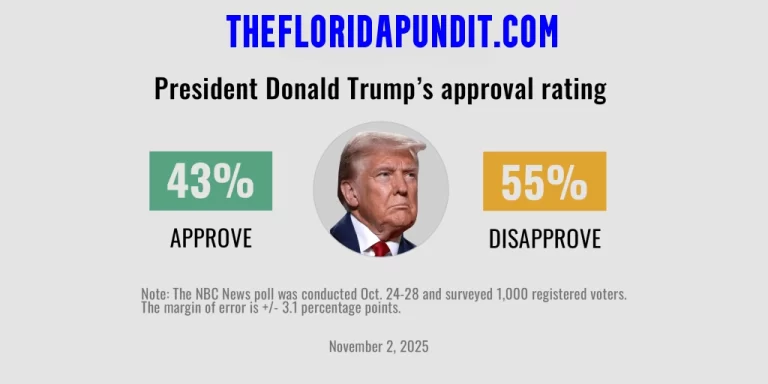As the 2026 midterm elections loom, Democrats are hoping voter frustration with President Donald Trump could give them an edge. A new NBC News poll shows roughly two-thirds of registered voters say Trump has fallen short on the economy and cost of living, and a majority believe he has failed to shake up business as usual in Washington.
Yet even as the Democratic Party touts its early lead in congressional ballots—50% to Republicans’ 42%—public trust in Democrats remains low. Only 28% of voters view the party positively, unchanged from record lows earlier this year. Independents, in particular, remain wary of the Democrats, leaving the party’s claims of momentum open to question.
Trump’s approval rating stands at 43%, down four points from March, with 55% disapproving of his performance. Still, Republicans retain strong leads on key issues like border security, crime, and immigration, while Democrats’ gains are largely limited to protecting constitutional rights, democracy, and health care.
The NBC poll also highlights voter concern over Trump’s approach to immigration enforcement. While 51% approve of his border security efforts, 54% disapprove of federal deployments in U.S. cities—a clear signal that even some Republicans question the administration’s tactics. Public perception of ICE is sharply negative, particularly among Black and Hispanic voters.
Economic dissatisfaction remains a central issue. Two-thirds of Americans say Trump has fallen short on cost-of-living issues, and 63% say he has failed to protect the economy. Even among Republicans who don’t identify as “MAGA,” there is acknowledgment of frustration over economic conditions.
Despite Democrats’ lead in some polls, their overall standing remains weak. Public confidence in the party is far lower than for Republicans, and their support is concentrated mainly among highly motivated Democratic voters. Independents’ skepticism of both parties suggests that election dynamics remain unpredictable.
Foreign policy offers little relief. Trump’s handling of the Gaza conflict draws mixed reviews, with 47% approving and 48% disapproving, while most Americans remain doubtful about a lasting peace agreement between Palestinians and Israelis.
Overall, while Democratic strategists point to Trump’s economic and political struggles as an opening, voter mistrust of the party underscores that any advantage is far from assured. One year out from the midterms, frustration with the status quo is clear—but so is skepticism of the Democrats’ ability to provide a compelling alternative.

